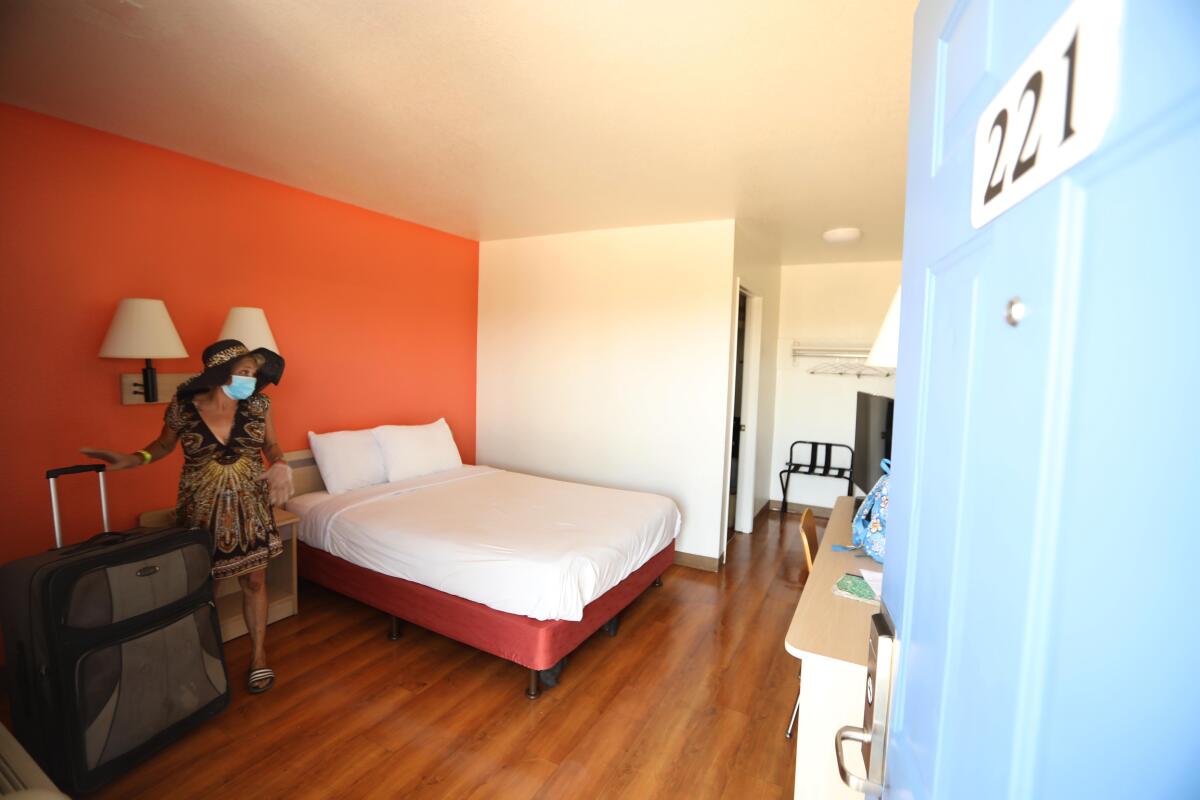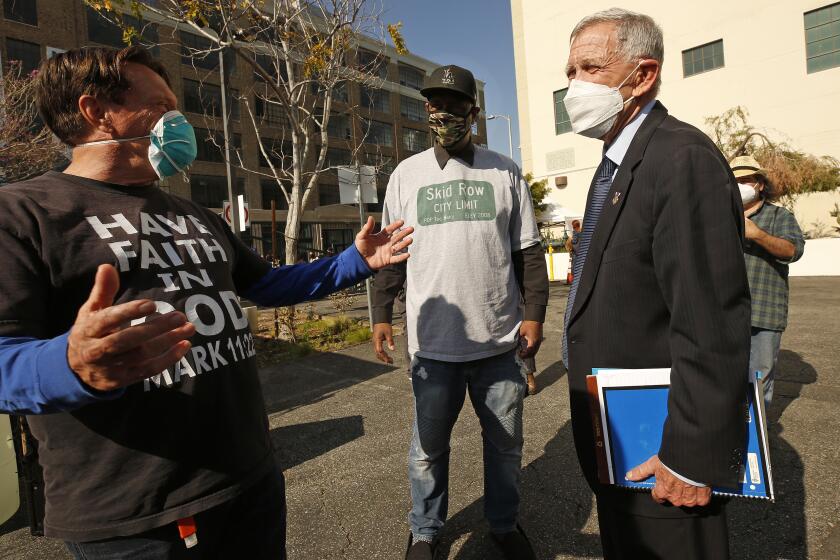Federal aid allows L.A. to extend hotel-room rentals for homeless people

- Share via
Los Angeles Mayor Eric Garcetti announced Wednesday that three hotels the city has been renting for vulnerable homeless people will stay open until the end of September, but stopped short of authorizing a major expansion of the hotel program, as some members of the City Council have urged.
The three hotels, which had been rented through a program known as Project Roomkey, total about 1,200 beds and had been slated to close either at the end of this month or next month.
About 900 homeless Angelenos are living in these rooms, and the city will seek to quickly fill the remaining beds with people from skid row — prioritizing women and seniors — and those living in large encampments like the one at Echo Park Lake. The mayor also said the city was looking at renting more hotels, but said it was premature to say how many.
“I always am very careful about not overestimating, but we’re looking at hundreds [of new beds] already,” Garcetti said. “I think we can get to a goal together with the … county of at least a couple thousand. I won’t turn down a single hotel that wants to do this.”
Last year, when the COVID-19 pandemic started, local officials scrambled to rent hotels for 15,000 homeless people who had been identified as especially vulnerable because of their age or medical conditions.
Across the county, they never got more than 3,774 rooms filled and 4,329 people indoors at one time.
As of last week, there were just under 2,000 rooms filled throughout the county. The program was expected to shut down entirely by the end of March, but lately elected officials and activists had called for it to expand after the Federal Emergency Management Agency increased the amount it reimburses cities and counties for renting rooms.
Under former President Trump, Los Angeles paid for each room and then expected to receive 75% of that money back. Last month, President Biden signed an executive order directing FEMA to reimburse municipalities 100% of what they spend on shelters with one-person rooms until the end of September.
An executive order signed by President Biden last week changed federal funding rules in a way that could potentially lift thousands of homeless Angelenos off the streets as the coronavirus continues to rage.
Jose “Che” Ramirez, deputy mayor for homelessness, said in an interview that the city is negotiating a lease with a roughly 200-bed hotel but that deal hasn’t been finalized. He added that his staff would look for other hotels to rent as well.
“We know hotel rooms are definitely the safest option during this pandemic,” Ramirez said.
Despite the bulked up reimbursement, Ramirez reiterated several challenges that come with renting the rooms. A dearth of nurses and outreach workers has made it difficult to properly staff them, and the homeless services providers contracted to run them are spread thin.
Additionally, city officials say they are confronting a severe budget shortfall that makes it hard to put up the money to rent rooms. The city so far has spent $350 million on its entire pandemic response, including Project Roomkey, and it could be years before those funds are fully reimbursed. Ramirez said the city is working with the state and FEMA to see if it could receive Project Roomkey money upfront.
At the county level, the Los Angeles County Board of Supervisors on Tuesday expressed interest in extending hotel and motel leases through September and possibly signing additional leases.
A federal judge, incensed by conditions for homeless people during the recent rainstorm, held a hearing on skid row to demand solutions.
In recent weeks, hotels sheltering homeless people continued to close — leaving the people in them with few options. So activists and elected officials were heartened to hear that the ones the city had continued to lease would stay open. Still they hoped the program would expand in a much bigger way.
“We need to be using the 100% FEMA reimbursement from the feds to house thousands, and I hope, tens of thousands of people,” said Councilman Mike Bonin.
Times staff writer Doug Smith contributed to this report.
More to Read
Sign up for Essential California
The most important California stories and recommendations in your inbox every morning.
You may occasionally receive promotional content from the Los Angeles Times.








